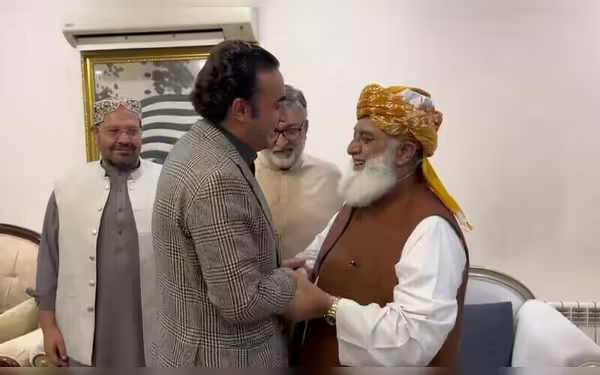Saturday, November 16, 2024 07:35 PM
Fazl: Master Dealmaker in Pakistani Politics
- Fazl mediates crucial constitutional amendment discussions.
- PTI delegation visits Fazl, emphasizing political unity.
- Fazl's influence shapes Pakistan's political landscape.
 Image Credits: dawn.com
Image Credits: dawn.comMaulana Fazlur Rehman plays a pivotal role in Pakistan's political negotiations and coalition-building amid proposed constitutional amendments.
In the ever-evolving landscape of Pakistani politics, few figures stand out as prominently as Maulana Fazlur Rehman. Known for his adeptness in negotiation and coalition-building, Fazl has become synonymous with the art of deal-making. Recently, he has been at the center of discussions surrounding proposed constitutional amendments, a topic that has sparked considerable debate among political factions.
On a day marked by intense political activity, Maulana Fazl attended a meeting of a special committee chaired by Syed Khursheed Shah of the Pakistan Peoples Party (PPP). This committee was established to explore the implications of the constitutional amendments being proposed, which could significantly impact the political framework of the country. The gathering highlighted the importance of collaboration among various political parties, as they seek to navigate the complexities of governance and legislation.
Later in the evening, a delegation from the Pakistan Tehreek-e-Insaf (PTI), led by Chairman Barrister Gohar Ali Khan, paid a visit to Maulana Fazl's residence. This meeting was not just a political maneuver; it also included a moment of unity as the delegation joined the Jamiat Ulema-e-Islam (F) chief in offering evening prayers. Such gestures are crucial in Pakistani politics, where personal relationships often play a pivotal role in shaping alliances and fostering dialogue.
Fazl's ability to bring together diverse political entities under one roof speaks volumes about his influence and strategic thinking. His role as a mediator in these discussions is vital, especially in a time when political polarization is rampant. By facilitating conversations between opposing parties, he is not only promoting dialogue but also working towards a more stable political environment.
As the political landscape continues to shift, the actions and decisions made by leaders like Maulana Fazl will undoubtedly have lasting effects on the future of Pakistan. It is essential for citizens to stay informed about these developments, as they directly impact governance and the democratic process. In a country where political dynamics can change overnight, understanding the intricacies of these negotiations is crucial for anyone invested in the nation's future.













